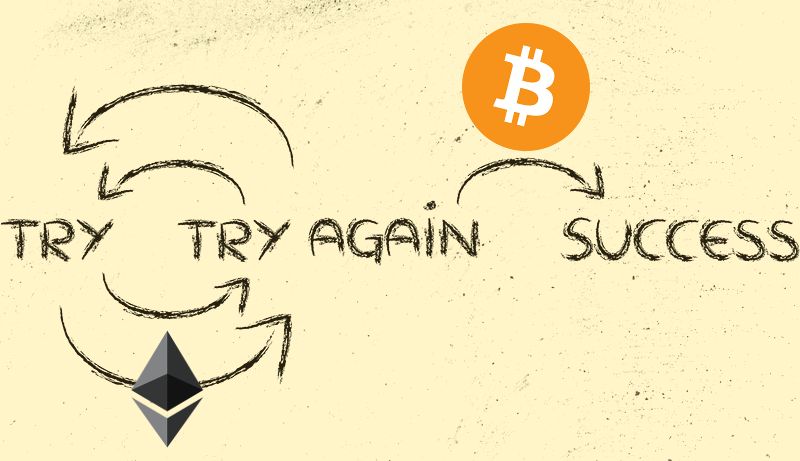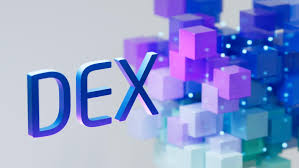Why did Ethereum 1.0 fail and Bitcoin succeeded?
This article is about 3,000 words, and it takes about 7 minutes to read the full text.

introduction
Unless there are major deficiencies, Ethereum 1.0 will not undergo a full redesign. Why is this? Why is Bitcoin performing much better? Two important factors are user experience and economics. At the very least, to make a product successful, it needs to be a powerful alternative to an existing problem, and the transaction cost must not exceed the economic value of the actual transaction. Together they point to the rising trajectory of Bitcoin and the downward trajectory of Ethereum 1.0.
- USDT, DAI, Libra, do we really need so many stable coins?
- "Received" game? BTC early investors have already left the market with high prices
- Ethereum 2.0 new virtual machine Ewasm guide: three advantages to fully hang EVM
There is a saying that if a product is to replace another product with network effects, it needs to be ten times better. Specifically, it must be good enough to prove that the painful conversion cost is worthwhile. Here, we will look at the most important competitors and see if these improvements can be called a 10 times better experience.
Bitcoin is 10 times better
Who is the most important competitor of Bitcoin? We will immediately think of gold, but the early inflation rate of Bitcoin is very large, far exceeding the mining of physical gold. At least for now, for gold enthusiasts, Bitcoin offers very little in terms of longevity, inflation and decentralization. It is not a competitive product.
In contrast, Bitcoin's most important competitor is the wire transfer/automatic clearing house (ACH) transfer. In developed countries, it is hard to imagine people who do not have a bank account, and those who use these workflows have as many bases as taxpayers. For wire transfers, mobile funds may cost $30 and require one business day, which could mean a total of three days because banks typically do not operate on weekends. Automated clearing house transfers are cheaper but slower and take 3-5 business days to complete.
 Bitcoin is significantly improved by 10 times compared with wire transfer/automatic clearing house transfer
Bitcoin is significantly improved by 10 times compared with wire transfer/automatic clearing house transfer
Bitcoin is a significant improvement, with a block time of 10 minutes and a fee of less than a penny for a long time. Unlike banks, Bitcoin does not close at 5 pm or on weekends. This is obviously a 10x improvement, so many years later many people continue to view Bitcoin as a consumer payment network rather than a settlement layer.
Bitcoin is today considered a substitute for gold rather than wire transfer, which is irrelevant. During the critical period of its formation, he was able to serve users by providing a clear alternative to bank transfers.
Ethereum results are 10 times worse
Who is the most important competitor of Ethereum? Many people think it is bitcoin, but Either is hardly equipped to provide substantial improvements in payment. Instead, it was not designed for payment, it is a general-purpose platform, originally called the "world computer."
Anyone can write their own decentralized applications. The world's computers are often referred to as Web 3.0's guides. In Web 3.0, Ethereum may be the backbone of a secure and decentralized Internet. Since the contemporary network is called Web 2.0, I think it is fair to say that Ethereum's top competitor is fair. The Internet and Ethereum share a common feature, that is, a platform that does not require a license, and anyone can use it as a basis.
 Unfortunately, Ethereum is 10 times worse than the version of the network it wants to replace.
Unfortunately, Ethereum is 10 times worse than the version of the network it wants to replace.
Modern networks are built using a client-server model and are highly scalable due to horizontal scaling (similar to sharding). This expansion capability is its super power: there are billions of Internet connected users, tens of billions of Internet connected devices, and more. The delay is usually small and is usually neurologically imperceptible. The bandwidth is sufficient to support streaming video, the cost is basically free, and subsidies are advertised.
In any sense, Ethereum is not a platform ready to provide improvements to contemporary networks. It's not enough bandwidth to upload small images (up to 13 KB per block can be uploaded). 15 transactions per second, can only support about 1 million active users per day. The delay is far more than the 2 second limit, which will limit users on the network. Each state change is approximately $0.06, which is poor given the large amount of interaction in the normal web browsing experience.
Unfortunately, Ethereum is not a 10x improvement that anyone seeks. Out of courtesy, we can say that the experience is 10 times worse. If we are honest, it is actually several orders of magnitude worse. Ethereum chose a battle that could not be won. The super power of Web 2.0 is extensible, and this is the weakness of Ethereum.
The economic reality is that the value of the transaction must exceed at least the transaction fee paid. Without this, we can't really expect the users involved. No one will be interested in leaving money on the table. The single-cost market behaves as you would expect, but multiple competitive fee markets may crowd out applications with low economic value.
Bitcoin's single application platform is smooth sailing
Bitcoin transactions are designed to transfer wealth. Although Bitcoin has secondary uses, such as gambling and storing data, the main features have the highest economic value. This means that using the platform as intended will not be hindered by secondary use.
Ethereum's multi-application platform has unexpected interactions
The deal on Ethereum is to power the dapps. Wealth transfer is a secondary use, but the design of the Ethereum is not for it. So what happens when low-value applications are on the same platform as high-value applications? Unless they all have considerable economic value, low-value applications may be completely unattended because of the high price. Imagine that a 1% transaction at the bottom of dapp A indicates that the fee needs to be higher than $0.06, while a top 99% transaction on dapp B indicates that the fee needs to be less than $0.06.
Wealth transfer makes the price of dapp on Ethereum too high and nobody cares
In the case of Ethereum, although its intended use case is for decentralized applications, the most common use of Ethereum is still to transfer wealth without dapps. Ironically, the feature that was identified as a secondary use for Ethereum has now set a benchmark for transaction fees that will allow the dapps to close.
Unlike transferring wealth, interacting with the network is not a high-risk workflow. If you try to authenticate on a website or update your Facebook status and there is an interruption or error, you can try again. There is no real risk of catastrophic loss, so there is little need for the kind of security, legal system or insurance that wealth transfer has. This is mainly due to the fact that software engineering does not require a license compared to other fields such as medicine or other engineering fields.
Wealth transfer has squeezed out Web 3.0 applications. This is the fate of most dapps, and they fail to provide an economic value over the current median cost of $0.06 per transaction.
The surviving Ethereum 1.0 dapp lacks traction
Having said that, there are already some types of dapps that provide enough economic value to survive. Most notably, they are gambling, decentralized exchanges for tokens on the chain, forecasting markets, ICOs and mortgage lending. Their common feature is that people are willing to pay for these workflows at the same cost as the benchmark transaction fee. (It's no coincidence that they involve a one-time transfer of potentially large sums of money.) However, the problem is that there are some specific market applications that are too ridiculous.
0x, one of the most popular decentralized exchanges (dex) agreements, with a market value of $160 million, only a lifetime transaction fee of $2,000. Tokens are not necessary for the operation of the agreement and are likely to be bypassed by the user's fork. The most popular forecasting market, Augur, only pledges a forecast of $40,000, but has a market value of $170 million. Japanese users without dapp can last more than 1,000, and only dozens of daily users exceed 100. These numbers are not quite right.
So why is Bitcoin doing so well, and Ethereum seems to be always struggling?
Bitcoin is 10 times more efficient than wire transfer/automatic clearing house transfers. Bitcoin has only one use case with high economic value, so the cost market will be adjusted according to the fees the user is willing to pay.
Compared with the contemporary network architecture, Ethereum 1.0 is 10 times worse. It is a very non-scalable system (single blockchain chain) that competes with highly scalable systems (modern networks). The situation is very bad, they need a complete new architecture. The transfer of wealth on Ethereum (not intended as a primary use case) created a benchmark transaction fee that drowned out all low-value applications (ie most applications). The number of surviving dapps was less than expected.
– The End –
Noah Rudeman
This article was compiled by the Credit Research Institute. The original link:
Https://medium.com/coinmonks/why-ethereum-1-0-failed-and-bitcoin-succeeded-72e9594b9789
The copyright of this article belongs to the original author, only represents the author's own point of view, does not represent the views or positions of the credit letter or the credit research institute.
We will continue to update Blocking; if you have any questions or suggestions, please contact us!
Was this article helpful?
93 out of 132 found this helpful
Related articles
- BTC short-term test for $9,800 resistance, the disk is not stable, should not chase
- Depth | The dry season is approaching, the analysis of Bitcoin mining industry chain
- The investment "block dog" just collapsed in two days and collapsed 400 people and lost more than 3 million yuan.
- A chain of listed companies in the blockchain business to make money behind the chain is still winter
- Market Analysis: BTC returns to 5 antennas, the rebound is about to open?
- IEO’s embarrassment, the era of “receiving wages” may be gone forever.
- Babbitt column | What is the investment thinking of the blockchain era?






